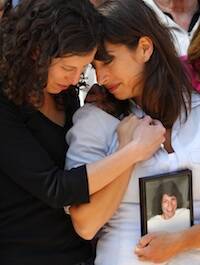Responding to reports of the death of Osama bin Laden on May 2, the Vatican spokesperson, Federico Lombardi, S.J., released a brief statement: “Osama bin Laden…bore the most serious responsibility for spreading divisions and hatred among populations, causing the deaths of innumerable people and manipulating religions to this end.
“In the face of a man’s death, a Christian never rejoices,” Father Lombardi said, “but reflects on the serious responsibilities of each person before God and before men, and hopes and works so that every event may be the occasion for the further growth of peace and not of hatred.”
Formal reaction around the Christian world to the death of Bin Laden generally followed the somber tone set by the Vatican statement. In Pakistan, where Bin Laden was killed after U.S. forces raided his compound on May 1, Christian schools and other institutions were closed and churches put on extra security. Paul Bhatti, a government adviser for religious minorities, said, “The situation is tense.”
“We are a soft target, as they cannot attack America,” said Lawrence Saldanha, archbishop emeritus of Lahore. Despite that short-term risk, Archbishop Saldanha hoped that the killing of the world’s most wanted terrorist would reduce the militancy that has engulfed Pakistan in recent years. “Many looked on Bin Laden as a hero of the Islamic revolution,” he said. “But he was a role model of extremism and a threat to world peace. His death will change the complexion and decentralize as well as demystify extremism.”
The Rev. Akram Javed Gill, who since 2007 has been in charge of St. Peter Canisius Catholic Church in Abbottabad, the gateway city to the northern mountainous region where Bin Laden was killed and about 150 Catholics live, witnessed the raid. “We never saw helicopters flying so low,” he said. “Nobody knew what was going on, and we thought it was a military exercise at first.” In the aftermath of the attack, Father Gill said heightened security halted his normal pastoral routine.
In the United States, representing the New Evangelical Partnership for the Common Good, David Gushee reacted to images of spontaneous celebration around the country after reports of Bin Laden’s death first surfaced. He cited Proverbs 24:17: “Do not rejoice when your enemies fall, and do not let your heart be glad when they stumble.”
He said, “A nation has a right to defend itself…but as Christians, we believe that there can no celebrating, no dancing in the streets, no joy, in relation to the death of Osama bin Laden.”
Mr. Gushee said, “War and all of its killing reflects the brokenness of our world. That is the proper spirit with which to greet this news.” He suggested that Bin Laden’s death offered an opportunity for Americans to “turn away from the rising disrespect toward Muslims” and reconsider questionable moves the United States has made “in the name of the war on terror.” These include, he said, indefinite detentions at Guantánamo Bay and the failure to investigate interrogation practices, the increase in Predator drone attacks in Pakistan “and the expansion rather than ending of the 10-year-old war in Afghanistan.”
Gushee called for a national reflection on how broader military and foreign policies—U.S. posture on the Israeli-Palestinian conflict, for example, and global military interventions—“create a steady supply of new enemies.”








